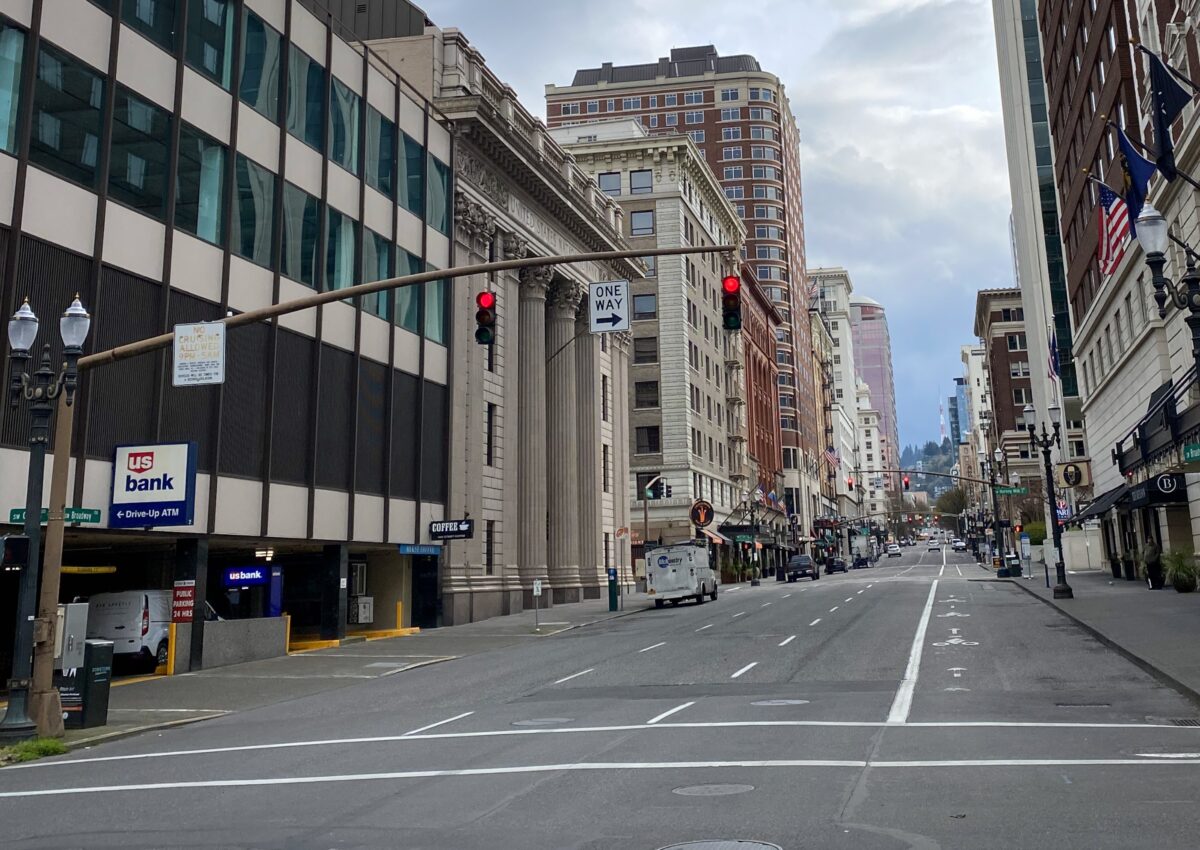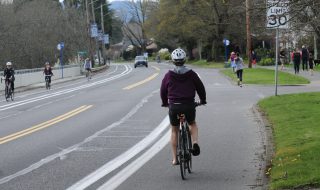
(Photos © J. Maus/BikePortland)
*Note: This article has been updated with new comments from Commissioner Eudaly. Scroll to bottom to read them.
“I’m not going to encourage anyone to leave their house unnecessarily.”
— Chloe Eudaly, Portland city commissioner
Portland City Commissioner Chloe Eudaly says despite radical shifts in transportation needs and behaviors due to the coronavirus outbreak, she does not plan to make any temporary changes to our streets.
In a Twitter post Friday afternoon in response to our questions about the issue, the commissioner wrote, “We need to stay home, we need to flatten the curve, we need our emergency vehicles to have unobstructed routes, and now is not the time for hastily executed street changes.”
Just over two weeks ago we published an article by north Portlander Sam Balto who started a petition to limit driving access on neighborhood greenways in order to provide more safe social distancing space for people who need to go outside. Since then, several cities across the country and globe have taken action to reconfigure streets so people who aren’t inside cars have more space.
Today there’s a growing consensus among advocates and experts that this is precisely the time for street changes.
With more people working from home, avoiding transit, and looking to get fresh air for mental and physical health, sidewalks and street shoulders are bursting at the seams. Meanwhile, car traffic is at an all-time low and lanes usually crowded with drivers are sitting empty.
Advertisement

Commissioner Eudaly said on Friday she considered “expanding the right of way for increased public use” before Governor Kate Brown’s “stay home” order (PDF) was issued on March 23rd; but then changed her mind. “I’m not going to encourage anyone to leave their house unnecessarily,” she wrote Friday.
Regardless of the conditions of our streets, barring a much more stringent lockdown order, many Portlanders will continue to leave their homes. People need to get to the store, to work, they need fresh air, they need exercise. A lot of people will do those things without using their cars. And right now our street space is unnecessarily inequitable in how it’s divided up. That fact is likely part of the reason why the Portland Parks & Recreation Bureau decided to manage their streets differently. Last week the agency closed roads to drivers in 10 popular parks in order to create more space for people.
Beyond simply providing for more — and safer — space for walkers and mobility device users, reducing the space used by drivers could also help stop a spike in reckless driving and speeding. If there’s one truism in transportation policy, it’s that given more space to drive, people will always use it to take more risks. On Friday, the Portland Police Bureau Traffic Division issued a statement saying, “With fewer cars on the road we are noticing a serious escalation in dangerous driving behavior.”
While Eudaly doesn’t see the need for any changes, local and national experts disagree.
Gwen Shaw is an engineer at the Portland office of Toole Design. She was also one of the key leaders who organized the changes on Naito Parkway that led directly to Better Naito, a once-temporary project has since been funded and will soon be implemented by Commissioner Eudaly’s transportation bureau. Shaw will be a featured in a webinar this Thursday about “rebalancing streets for people” during the coronavirus pandemic.
Advertisement
“This is the time to reset and reboot our transportation system…That means design, experiment and use cheap and quick tactical materials to close the gaps for the bicycle, transit and carpool lane networks.”
— Timothy Papandreou, Emerging Transport Advisors
“As we face unprecedented times right now,” Shaw shared with me recently, “there is more need than ever to do this.” “We’re hopeful that this webinar can be used widely by communities and agencies of all scales to provide safe places for all people to enjoy the outside world while maintaining safe physical distances.”
Timothy Papandreou spent seven years in various positions with the San Francisco Municipal Transportation Agency (including chief innovation officer and director of strategic planning and policy) before founding Emerging Transport Advisors in 2018.
In an article published Friday by Forbes, Papandreou said now is a major opportunity for cities to alter streetscapes. “This is the time to reset and reboot our transportation system and look at it from the lens of people, culture and our new reality. That means design, experiment and use cheap and quick tactical materials to close the gaps for the bicycle, transit and carpool lane networks,” he wrote. “Post-crisis when we start to recover, people will slowly come back. If you have these new networks and spaces in-place people will utilize them and new travel behaviors will stick.”
Instead of seizing an opportunity to change our streets for considerable short-term benefits that align directly with long-term planning goals, Eudaly will wait until movement restrictions are relaxed. In her tweets Friday she wrote that PBOT is prepping an online platform where people can share feedback about, “how we can better use our streets when the order is lifted.” “I hope to have some new changes ready to showcase and a blowout (if socially distanced) Sunday Parkways event for the first weekend we are free to roam.”
Further reading:
— Op-Ed: Let’s Build a Network of ‘Quiet Streets’ via Streetsblog
— City to test road closures, putting more space between pedestrians via Calgary Herald
— COVID19 Livable Streets Response Strategies, a Google Sheet tracking national/global street changes created by Michael Lydon, a principal at Street Plans.
UPDATE, 3/31: Commissioner Eudaly responded to this story on our Facebook page last night. Here’s what she said:
I’ve traveled around the city over the weekend: Woodlawn, Arbor Lodge, University Park, St Johns, Boise, Eliot, Old Town, West End, Burnside from the river past 23rd Ave, West Hills, Central East Side, and Kerns. I’ve also been by several city parks. Nowhere did I see “sidewalks and street shoulders… bursting at the seams.” Not even close. Please tell me where this is happening in Portland—a not terribly dense city dominated by single family homes, not residential high rises.
Besides encouraging people to stay home and flatten the curve, working to stave off a mass wave of evictions, foreclosures, bankruptcies and business closures, getting critical information out to the public, and preparing my bureaus for massive budget cuts, I’ve been focused on the most serious public health and safety threat on our streets—people living on them. We considered closing streets in Old Town for camping—it proved problematic for a variety of reasons—emergency vehicle access, as well as access for housed residents and businesses. Instead we are identifying city owned property for safe sleep sites.
Resources are stretched thin. People are freaked out. Like I said, it’s not the time for hastily planned street closures (closing streets in parks is not remotely comparable to closing residential streets) with no public engagement.
I am a fan of streets for people, reclaiming public space, and creating a more equitable transportation system. The fact that I have other more urgent priorities right now doesn’t change that. As we get a clearer picture of what this crisis could look like over the next few weeks it’s possible we’ll revisit the issue. But for now, I’m focused on the most vulnerable people in our community…
I’m really disappointed in this article. You’ve all seen the flack I take over a “lack of public engagement” when we spend months doing outreach to hundreds of people. How do you think this would go over? I know advocates are gonna advocate but for god’s sake, a little credit, a little understanding, and some sense of priorities would be great right now.
— Jonathan Maus: (503) 706-8804, @jonathan_maus on Twitter and jonathan@bikeportland.org
— Get our headlines delivered to your inbox.
— Support this independent community media outlet with a one-time contribution or monthly subscription.

